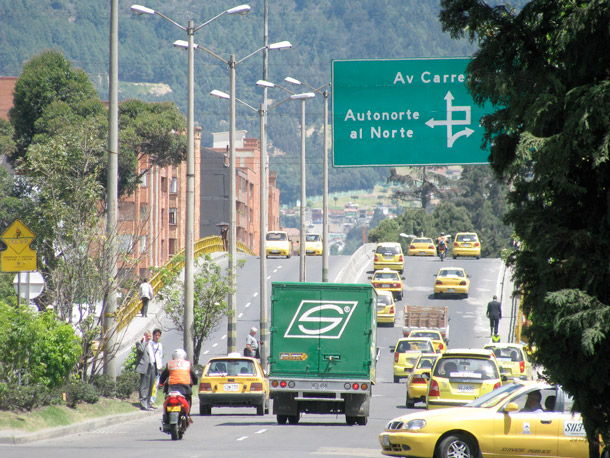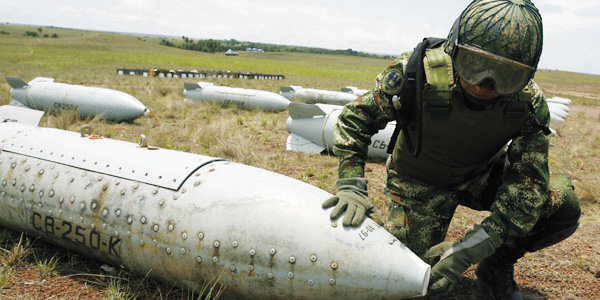 On Trial is a Bogotá Post feature in which we will put someone or something from the Colombian news “on trial”, trying to explain the perspective of both their fans and their critics.
On Trial is a Bogotá Post feature in which we will put someone or something from the Colombian news “on trial”, trying to explain the perspective of both their fans and their critics.
 In this edition Mike Mackenna looks at the peace process with the FARC, which has made enough progress recently to be described as “irreversible” by many media outlets
In this edition Mike Mackenna looks at the peace process with the FARC, which has made enough progress recently to be described as “irreversible” by many media outlets
For the Prosecution |
For the Defence |
| SUMMARY
• Peace deal is too easy on the FARC, punishing them with only eight years maximum of restricted liberty, with no prison time • The FARC will not even compensate their victims economically, dubiously claiming they have no money • The deal rewards the FARC for their criminality by giving them guaranteed congressional seats • The deal debases the troops by subjecting them to the same justice as the FARC Ladies and gentlemen of the jury, I want to clarify something right from the beginning: I am not an ‘enemy of peace’, as many of the peace-process advocates describe people like me. I am, however, an enemy of impunity, an enemy of terrorism, and a defender of the dignity of our armed forces. Let’s start with the impunity. The terrorists in the FARC – who have murdered, kidnapped, and massacred Colombians for decades – will have a maximum penalty of eight years of restricted liberty if they tell the truth about their crimes. Lead government negotiator Humberto de la Calle has ruled out prison for the FARC; some possible penalties might include de-mining, or replacing coca crops with legal alternatives. Our justice system, then, ladies and gentlemen, will send a man to prison for three years for using one counterfeit bill in a store, will give another man three years for stealing cheese, but it won’t put men in prison who are guilty of thousands of heinous crimes? Considering this lenient treatment, we could at least expect the FARC to give their victims economic restitution, but that’s apparently out of the question, too. Lead FARC negotiator Iván Márquez told the BBC in December, “The FARC have no money.” The Israeli edition of Forbes Magazine tells a different story, though, asserting that the FARC have yearly revenues of USD $600 million from drug trafficking, kidnapping, and illegal mining; making it the third-wealthiest terrorist group in the world. In fact, the FARC aren’t just getting off easy for their crimes; they’re getting rewarded. President Santos appears to support guaranteeing the FARC seats in the Congress, asking rhetorically if it was too high a price to pay to end 50 years of war. Well, Mr President, I want peace like all Colombians, but not at any cost. Just as I am not willing to stomach seeing FARC leader Timochenko in Congress, I am also not willing to tolerate seeing our armed forces reduced to the level of terrorists. Our soldiers who risked their lives to defend our democracy will have to go through the same transitional justice process as the FARC. I don’t know about you, but I don’t want to tell the families of the countless murdered soldiers that the murderers are now the same as our troops in the eyes of the law. I don’t want to see the terrorists responsible for almost three million victims in the armed conflict since 1985 being treated as equal to our heroes in uniform. The goal of a peace negotiation is ultimately to make people safer. I ask you then, ladies and gentlemen of the jury, does this peace process achieve that goal? Are people really safer when terrorists can kill with impunity? Are people really safer when terrorists can make a fortune and walk away with it? Are people really safer when our justice system makes no distinction between our brave soldiers and a group of kidnapping, drug-dealing murderers? |
SUMMARY
• The only alternative to the talks is more war • There would be no peace deal if the government insisted on prison time and confiscation of all assets, and in any case, a recent study of peace agreements shows that prison sentences don’t guarantee peace • The peace talks have already saved 5,000 lives by reducing FARC attacks to historic lows • The FARC need guaranteed Congressional seats because they have been crushed in their past attempts at political participation Ladies and gentlemen of the jury, I’d like you to ask yourselves a question: What happens if the prosecution wins? What comes next? More war? More deaths? More kidnappings? More people forced off their land? Ask yourself one more question: If the prosecution is so concerned about the safety of Colombians, why does he not want a peace deal signed? Why is the prosecution not applauding the 92% reduction in harm to civilians that came as a result of the FARC’s unilateral ceasefire negotiated during these peace talks? The prosecution is making the mistake that Voltaire warned us about when he said, “Don’t let the perfect be the enemy of the good.” Yes, in a perfect world, the FARC would go to prison (although even that is debatable – a recent study of peace agreements by a Notre Dame professor shows that prison sentences don’t reduce the chances of recidivism among the demobilised) and give us all their bank account numbers. However, in the real world, terrorist groups don’t sit at the negotiating table so they can go to prison and have all their money taken away. In a perfect world, the FARC wouldn’t need guaranteed seats in Congress. They’d be able to run for office without fearing for their safety. In the real world, though, the FARC know how dangerous it is for them to get involved in politics after they helped form a political party called the Unión Patriotica, whose members were massacred by the thousands because of the UP’s association with the FARC. And finally, in a perfect world, the armed forces would uphold the law without fail against terrorists like the FARC. But I submit to the jury, that in the real world, the military murdered thousands of civilians in cold blood to pass them off as guerrillas killed in combat, and formed alliances with the bloodthirsty paramilitaries to battle the FARC. Now, I’m not just asking you to be pragmatic and accept all these painful compromises in the name of peace. I’m also asking you to recognise the real gains the peace process has made. I’m asking you to recognise that the FARC going to Boyajá, a small town in the coastal department of Chocó, to ask forgiveness for one of their most notorious massacres is a transformative, historic moment. Is there any jail sentence more powerful than having to ask for absolution from a town which lost ten percent of its population, including 47 children, because you fired an errant rocket into their church? Let the record show that the gains from this process aren’t just symbolic, either. According to the Foundation for Peace and Reconciliation, FARC attacks were at their lowest in 30 years in 2014, which translates to an estimated 5,000 lives saved. In response to the prosecution’s question, then, about if these peace negotiations have made Colombia safer, the answer is a definite yes. At least 5,000 lives safer. This deal might not be good enough for the perfect world the prosecution wants to live in, but in the real world, it is an astonishing achievement. |
[polldaddy poll=9280087]
The Opinion section is a space for your views and opinions. We’ve featured articles on all aspects of life in Colombia – from the free trade agreement to bull fighting.Whether you agree or disagree with anything we’ve written, we’d love to hear your thoughts – leave a comment below, tweet us at @bogotapost, post on our Facebook page /BogotaPost or email us at [email protected].The articles in ‘Opinion’ are commentary, not news reporting. The views expressed in this section are those of the author and do not necessarily reflect those of The Bogota Post or its publishers. The publishers take no responsibility for the accuracy of any information published in this section. |






